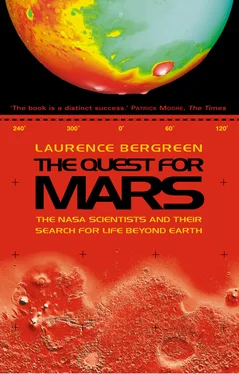The force of the new paradigm – that life on other planets was probably tiny – spun Jim’s thinking in a new direction. “We were still a few months before the launch of Pathfinder and Mars Global Surveyor, and the question was asked, ‘What could be done with these ready-to-go spacecraft to look for more signs of life?’ ” Suddenly, Jim’s Mars mission had a new reason for being. He had always believed it presumptuous to assume that life existed only on Earth, and he was sympathetic to the meteorite team’s conclusions about ALH 84001. Their research science was rigorous, it was cautious, and it was consistent with the latest findings concerning extremophile life. There was something in that meteorite that could not be explained away by conventional arguments. Jim agreed with the team that the burden of proof had now shifted to those who insisted there was no life on Mars. If that was the case, he said, “an interesting explanation as to why life failed to make at least a tenuous foothold would have to be crafted.”
The midsummer Martian madness started in earnest a couple of weeks before publication of the article, when Dan Goldin, the mercurial, publicity-loving head of NASA, heard that Science had accepted the article for publication. Next, the White House wanted to make a grand occasion out of the discovery of possible life on Mars. In preparation for the announcement, Goldin summoned David McKay and Everett Gibson to Washington. “We had thirty minutes scheduled with Dan to talk about the meteorite,” Everett told me. “After an hour and a half, Dan said, ‘You guys take a break, I’ve got some things to do, and then we’ll continue.’ During the break, he dictated a commencement address he was going to deliver at UCLA and handled a few other things, and then we continued for another hour and a half. I felt like I was giving an oral defense of a Ph.D. thesis. I mean, Dan went back to first principles, and he took twenty-eight pages of notes.” At the end of the ordeal, Dan Goldin had one last question for the two scientists: “Can I give you a hug?” The gesture was pure Goldin. In general, NASA is not a touchy-feely place – but Goldin is a man of enthusiasms.
After that, the story began to leak everywhere. Space News , a weekly trade journal, hinted at the forthcoming Science paper about ALH 84001, and the buzz preceding an important Washington story started; then things suddenly went awry. At the stylish Jefferson Hotel in Washington, Dick Morris, an advisor to President Clinton, told a prostitute named Sherry Rowlands about the discovery, in the vain hope of impressing her. “Is it a bean?” she asked. Well, no, not really, he replied. It was, uh, more like … a “vegetable in a rock.” When Rowlands got home and opened her diary to write about her day with Dick, she noted, “He said they found proof of life on Pluto.” Scientists dread being misunderstood by the public, but who could have imagined the magnitude of misunderstanding generated by this discovery? The situation deteriorated even further when the befuddled hooker tried to peddle the story to the tabloids, which turned out to be more interested in extraterrestrial life in the form of little green men than vegetables in rocks, thank you. And her inability to recall just what planet Dick said they’d found life on – Saturn, maybe? – didn’t help her credibility, either. There was no sale.
The life-on-Mars story quickly took on a life of its own. The CBS Evening News was making disturbing noises that it might break the news even before confirmation, according to an account that appeared in Texas Monthly . Other networks sensed news in the making and assigned reporters. Science tried to halt misunderstandings by posting the article on the Internet shortly before publication. On the first day alone, the website received over a million hits. Giving substance to an age-old dream, and terror, the article’s findings excited worldwide attention. The announcement gave new impetus to America’s expensive, beleaguered space program, especially its investigations of Mars. Goldin was delighted to confront a challenge of this magnitude, and the mood surrounding it recalled the great days of the space race, when Americans had an emotional investment in NASA and the nation’s fortunes seemed to rise and fall with the agency. But the issue of life on Mars was more complicated to explain to the public and sell to Congress than sending people to the moon had been. There was no life-on-Mars race for politicians to exploit. National security and national pride were not at stake. Only the science really mattered. The discovery involved concepts difficult for most people, even scientists, to understand, including a meteor of unimaginable age that had traveled to Earth from an unimaginable distance, containing evidence of life that was unimaginably tiny.
NASA finally made the announcement at a flashy press conference, at which an exuberant Dan Goldin proclaimed, “What a time to be alive!” (And the head of NASA, he might have added.) Bill Clinton, campaigning for reelection, appeared on the South Lawn of the White House to hail the discovery as if it were another triumph for his administration, but he actually sounded a note of caution that went largely ignored: “If this discovery is confirmed, it will surely be one of the most stunning insights into our universe that science has ever uncovered.” That was still a big if . And his declaration that the American space program would now “put its full intellectual power and technological prowess behind the search for further evidence of life on Mars” did not necessarily mean additional money for a beleaguered NASA. His words amounted to a mere presidential pat on the back.
The summer of Mars was underway. For a while, the names of the several NASA scientists on the meteorite team – McKay, in particular – were known to journalists and the general public. The sudden popularity threw the scientists for a loop. They naturally desired professional recognition, but not celebrity. In their line of work, being famous meant being considered suspect, a semi-charlatan, a talking head rather than a working research scientist. None of them aspired to become the next Carl Sagan, bridging the gaps among the media, the scientific community, and the public. Although their thinking was revolutionary, they weren’t visionaries; they just wanted their funding, and they wanted to pursue their scientific interests. The announcement concerning ALH 84001 made it harder for them do that, as publicity insinuated itself into the normally orderly process of disseminating scientific information. Instead of addressing specialists at conferences and publishing in specialized journals, science teams proclaimed their findings in press releases, in advance of publication. Freed of the constraints imposed in a refereed publication such as Science , the releases tended to make larger claims than the articles that inspired them. Conducting science by press release troubled many, including those engaged in the practice.
The announcement concerning ALH 84001 transformed NASA. For the first time, many people realized that NASA supports scientists, not just astronauts and engineers and the crews that send them into space. In its youth, NASA had accomplished one spectacular engineering feat after another: putting an astronaut in orbit, sending astronauts to the moon, keeping astronauts in orbit for months on end. These missions included science, but science was rarely the point. Flags and footprints on the moon were the point. Astronauts did collect a few hundred pounds of moon rocks for scientists to analyze, but the public had scant interest in lunar geology. Now, with the announcement of possible nanofossils in ALH 84001, NASA scientists were no longer overlooked. And with the end of the cold war, they could participate in missions that were primarily scientific rather than political, missions that might become more significant than sending people to the moon. They suddenly had an opportunity to devise experiments exploring fundamental questions about the nature of the universe and the origins of life. Their results of their search, a NASA report concluded, “may become a turning point in the history of civilization.”
Читать дальше












